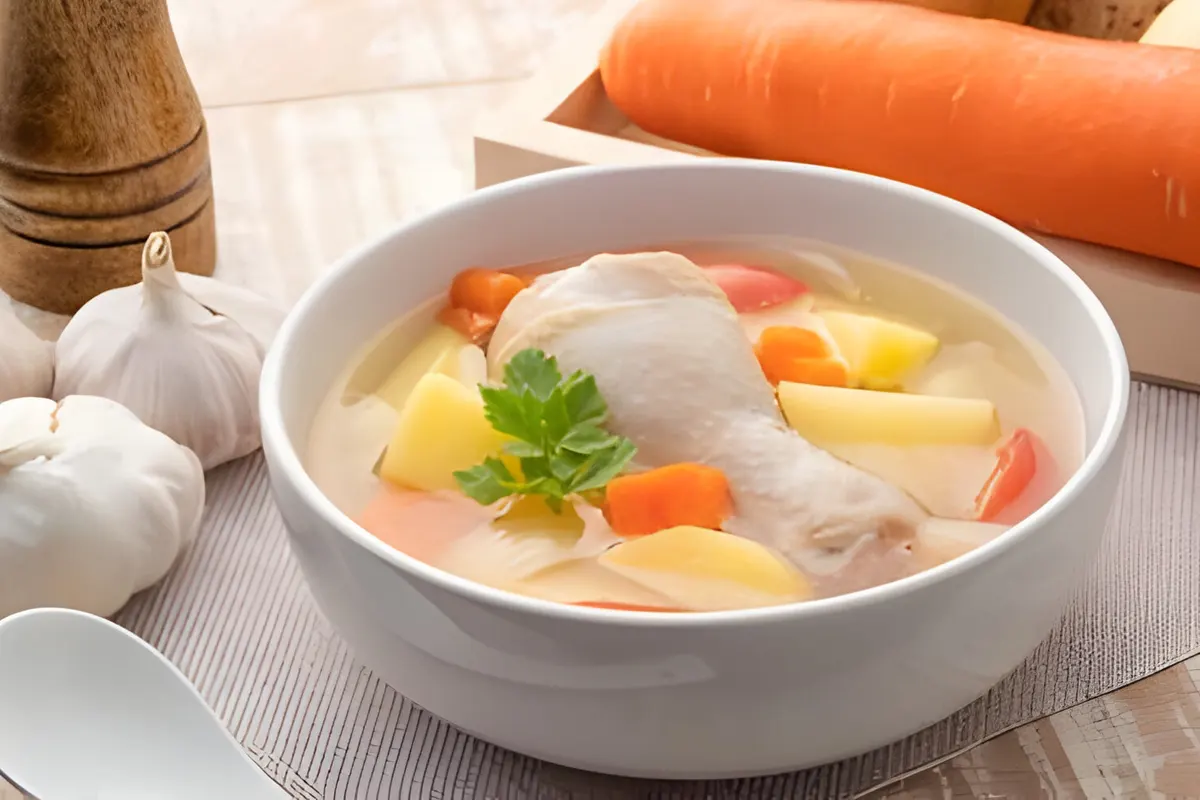Diving into the world of chicken broth, we embark on a flavorful journey that’s more than just a simple liquid used in cooking. This culinary staple, rich in history and versatility, forms the backbone of countless dishes around the globe, much like the flavorful and aromatic chicken rub that enhances smoked chicken recipes. From comforting soups to the most sophisticated sauces, chicken broth brings depth and complexity to recipes, making it a must-have in every kitchen. But there’s more to this humble ingredient than meets the eye. As we explore its varieties, health benefits, and culinary uses, we’ll also uncover the secrets to choosing the best chicken broth and even how to make your own. So, let’s stir the pot and delve into the savory world of chicken broth.
Introduction to Chicken Broth
Ah, chicken broth—the unsung hero of the culinary world! This golden elixir does more than just warm the soul; it’s the secret weapon in a chef’s arsenal, adding richness and flavor to dishes that might otherwise fall flat. But what exactly is chicken broth, and why does it hold such a revered place in kitchens across the globe?
What is Chicken Broth?
At its core, chicken broth is a flavorful liquid made by simmering chicken, often with vegetables, herbs, and spices. It’s the foundation of countless recipes, from the simplest of soups to the most elaborate sauces. But chicken broth isn’t just about taste; it’s steeped in tradition, with each spoonful carrying a story from kitchens of yore, similar to the secrets of smoked chicken that unveil master techniques.
The Cultural Tapestry of Chicken Broth
From the bustling streets of Bangkok to the cozy kitchens of Tuscany, chicken broth transcends borders, each culture adding its unique twist, akin to the art of keeping chicken moist while smoking, ensuring succulent results every time. In some places, it’s a remedy for the common cold; in others, a base for celebratory feasts. This culinary chameleon adapts to the palate of its people, proving that good taste knows no boundaries.
So, whether you’re a seasoned chef or a home cook, understanding the nuances of chicken broth can elevate your cooking from good to great. Let’s embark on this savory journey together, exploring the depths of flavor that chicken broth can bring to your table.

Types and Varieties
Dive into the world of chicken broth, and you’ll quickly discover it’s not a one-size-fits-all ingredient. The variety is astounding, each type bringing its own unique qualities to the table. To understand more about dietary guidelines that influence these varieties, explore the FAO’s background on food-based dietary guidelines. Let’s unravel the mysteries of these broths and find out which one can best elevate your culinary creations.
Types of Chicken Broth
When we talk about chicken broth, we’re opening a Pandora’s box of options. On one side, we have the traditional homemade broth, simmered for hours, coaxing out every bit of flavor from the chicken and its accompaniments. It’s like a warm hug from grandma, rich in taste and comfort. Then there’s the store-bought variety, a convenient option for those tight on time but still looking for quality, much like exploring what liquid to use when smoking chicken to unlock flavor and moisture. These broths range from organic to low-sodium, catering to various dietary needs and preferences.
Organic, Low-Sodium, and Regular Options
For the health-conscious, organic chicken broth is a godsend, free from additives and made with chickens raised without antibiotics. It’s clean eating in liquid form. Then there’s the low-sodium broth, a heart-friendly option that lets you control the salt level in your dishes, ensuring that your meal is flavorful without overdoing it. And of course, we can’t forget the regular chicken broth, the all-rounder that’s ready to jump into any recipe you have in mind.
Bone Broth vs. Traditional Broth
Enter the trendy bone broth, a thicker, more gelatinous concoction simmered for an extended period to extract the goodness from chicken bones. It’s not just a broth; it’s a nutrient powerhouse, packed with minerals and collagen. Comparatively, traditional chicken broth is lighter, made primarily from the meat and, sometimes, the bones, offering a more delicate flavor suitable for a variety of dishes.
Flavored Broths
And then, there are the flavored broths, infused with herbs, spices, and even vegetables, adding an extra layer of complexity to your dishes. Imagine a broth simmered with rosemary and thyme, or one with a hint of ginger and lemongrass. These broths are not just ingredients; they’re a canvas, ready to be painted with the flavors of your choice.
Choosing the right chicken broth can be akin to selecting the perfect wine for dinner—it has to complement the dish, enhancing without overpowering, just as selecting the best pizza dough for a bread machine can elevate your homemade pizzas. So next time you’re at the store or pondering over a pot on the stove, think about the endless possibilities that these broths bring to your culinary adventures.

Health Benefits and Nutritional Information
Sipping on a warm cup of chicken broth is not just comforting; it’s akin to giving your body a nutritional hug, similar to the benefits of a gluten-free chicken noodle soup, offering comfort and nutrition. Learn more about the foundational role of nutrition in child development from UNICEF’s overview on nutrition. Beyond its culinary prowess, this humble liquid is a treasure trove of health benefits, making it a staple not just in kitchens but also in wellness routines. Let’s ladle through the nutritional broth and uncover the goodness simmering within.
Nutrients and Minerals
Chicken broth is more than just water with a chicken essence. It’s a concoction brimming with essential nutrients and minerals. Each sip delivers a dose of protein, essential for building and repairing tissues. Then there are the minerals like calcium, magnesium, and phosphorus, which play a crucial role in bone health. And let’s not forget the electrolytes, such as sodium and potassium, vital for hydration and maintaining the body’s fluid balance.
Bone Broth Benefits
The buzz around bone broth isn’t just hot air. This chicken broth variant, rich in collagen, can be a boon for joint health, potentially easing the creaks and aches that come with age. The amino acids present, like glycine and proline, are the unsung heroes supporting gut health and aiding in digestion. It’s like a wellness potion, one that’s been simmered to perfection.
Dietary Considerations
In the world of broths, not all are created equal, especially when it comes to dietary needs. For those navigating the gluten-free landscape, the question arises: “Which chicken broth is gluten-free?” The answer lies in the label. Many store-bought broths are indeed gluten-free, but it’s crucial to read the fine print, as some may contain additives or flavorings derived from gluten sources. Opting for organic or making your own broth at home can often be the safest bet for those looking to steer clear of gluten.
Chicken broth isn’t just a culinary ingredient; it’s a vessel of nourishment, offering a spectrum of health benefits. Whether you’re sipping it straight or using it as a base for your favorite dishes, incorporating this nutrient-rich liquid into your diet can contribute to overall well-being. So, the next time you enjoy a bowl of soup or a savory stew, remember the myriad of benefits that come with every spoonful of chicken broth.
Culinary Uses and Recipes
Chicken broth isn’t just a liquid; it’s a liquid goldmine in the culinary world, infusing dishes with depth, warmth, and complexity. Its versatility knows no bounds, from soups to sauces, making it an indispensable ingredient in any cook’s pantry. Let’s dive into the myriad ways this brothy wonder can transform your cooking.
Culinary Uses of Chicken Broth
The beauty of chicken broth lies in its versatility, much like the diverse uses of naan in culinary creations, offering a canvas for a variety of flavors. It’s the secret ingredient that elevates a simple risotto to a creamy delight, giving it that unctuous, mouth-coating texture. In soups and stews, it’s the backbone, providing a rich base that carries the flavors of all other ingredients. But its magic doesn’t stop there. Chicken broth can be the unsung hero in your sauté pan, deglazing it to create a simple yet flavorful pan sauce. And when it comes to cooking grains, swapping water for chicken broth can turn a mundane side dish into a savory masterpiece.
Popular Recipes Featuring Chicken Broth
Classic Chicken Broth Soup
Ah, the classic chicken soup – it’s not just food; it’s a feeling, a remedy, a tradition passed down through generations. The key to a soul-warming chicken soup is a robust chicken broth, simmered with love, patience, and a mélange of vegetables and herbs. It’s comfort in a bowl, whether you’re under the weather or just seeking a taste of home.
Risotto and Other Rice Dishes
Risotto, the epitome of Italian comfort food, owes its creamy, dreamy texture to one ingredient – chicken broth. The gradual addition of warm broth, ladle by ladle, allows the rice to release its starch, creating that signature creamy consistency. But why stop at risotto? Chicken broth can transform any rice dish, infusing it with flavor and turning the humble grain into a culinary delight.
The culinary potential of chicken broth is as vast as your imagination. Whether it’s the star of the show in a comforting soup or playing a supporting role in a risotto, its ability to enhance and enrich dishes is unparalleled. So, the next time you’re pondering what’s missing in your dish, consider reaching for that pot of chicken broth – it might just be the golden touch your recipe needs.

Choosing the Best Chicken Broth
Navigating the broth aisle can be a bit like finding a needle in a haystack—with so many options, how do you choose the best chicken broth for your culinary needs? Fear not, for with a few tips and tricks up your sleeve, you’ll be able to make an informed choice that’ll elevate your dishes from good to gourmet.
Factors to Consider When Buying
When it comes to selecting the perfect chicken broth, it’s all in the details. Start by scrutinizing the label for clues about the broth’s flavor profile and ingredient quality. A good rule of thumb is the shorter the ingredient list, the better. Look for broths that boast real chicken and vegetables over artificial flavorings and preservatives. And remember, the proof is in the tasting—don’t shy away from trying a few brands to find the one that tickles your taste buds just right.
Ingredients and Additives
In the quest for the best chicken broth, ingredients play a starring role. Opt for broths that use organic chicken, as they’re likely to be free from antibiotics and hormones. Also, keep an eye out for unwanted additives like MSG or excessive salt, which can overshadow the natural flavors you’re after. For those with dietary restrictions, checking for gluten or other allergens is a must.
Brand Comparisons and Reviews
In today’s digital age, we’re fortunate to have a wealth of information at our fingertips. Leverage online reviews and culinary forums to gauge the reputation of different chicken broth brands. Often, the collective wisdom of fellow food enthusiasts can lead you to hidden gems that you might otherwise overlook.
Making Your Own Chicken Broth
While store-bought options are convenient, there’s something undeniably satisfying about making your own chicken broth. It’s a simple process that not only yields a rich, flavorful broth but also allows you to control the ingredients and sodium level. All you need is a chicken (whole or parts), water, and a selection of vegetables and herbs. Simmering these ingredients slowly coaxes out their flavors, resulting in a homemade broth that’s both nutritious and delicious.
Choosing the right chicken broth can be the difference between a good dish and a great one. Whether you’re perusing the grocery store shelves or simmering a pot on your stove, taking the time to select or make a quality broth will pay dividends in your cooking. So, the next time you’re faced with the broth dilemma, remember that the best choice is one that aligns with your taste preferences and culinary values.
Storage and Preservation
Once you’ve found or made that perfect batch of chicken broth, the next step is ensuring it stays fresh and flavorful for as long as possible. Proper storage and preservation are key to maintaining the quality of your broth, whether it’s homemade or store-bought. Let’s dive into the best practices for keeping your chicken broth at its peak.
Storing Chicken Broth
The fridge is your friend when it comes to short-term storage of chicken broth. A sealed container can keep the broth fresh for up to 4-5 days. But, let’s be real, sometimes plans change, and you might not use it all in that timeframe. That’s where freezing comes into play. Pour the broth into ice cube trays or freezer-safe bags, and you’ve got yourself portion-sized broth cubes ready for your next culinary adventure. Just remember to leave some space for expansion when freezing in containers.
Shelf Life and Expiration
While store-bought chicken broth comes with a best-by date, it’s always wise to trust your senses. A quick sniff and visual check can save you from using a broth that’s past its prime. For homemade broth, marking the storage date can help you keep track of freshness. And when in doubt, remember the golden rule: when it comes to food safety, it’s better to be safe than sorry.
Preservation Techniques
For those looking to go the extra mile in broth preservation, techniques like canning and vacuum sealing can extend the shelf life significantly. Canning chicken broth requires a pressure canner to ensure it’s free from bacteria and safe for pantry storage. Vacuum sealing, on the other hand, removes air from the bag before freezing, minimizing the risk of freezer burn and extending the broth’s freshness.
Proper storage and preservation not only extend the life of your chicken broth but also ensure that its flavors remain as rich and robust as the day it was made or bought. By following these simple guidelines, you can always have high-quality chicken broth on hand, ready to enhance your soups, stews, and sauces at a moment’s notice. So, the next time you find yourself with leftover broth, remember that a little effort in storage can lead to a lot of flavor in your future dishes.
FAQs About Chicken Broth
In the world of chicken broth, questions abound. From its health benefits to culinary uses, there’s always more to learn about this versatile ingredient. Let’s tackle some of the most common queries, shedding light on the savory secrets of chicken broth.
Is chicken broth good for you?
Absolutely! Chicken broth is not just tasty; it’s also packed with nutrients. It’s a good source of essential minerals like calcium and magnesium, beneficial for bone health. Plus, the collagen from bone-based broths can support joint health. Just keep an eye on the sodium content, especially in store-bought options.
Can chicken broth be used as a base for vegetarian dishes?
While traditional chicken broth is, well, chicken-based, there are plenty of vegetable broths that offer a similar depth of flavor for vegetarian dishes. However, for those who eat meat, chicken broth can add a rich, umami flavor to vegetarian recipes without overpowering the taste of the vegetables.
How can I enhance the flavor of store-bought chicken broth?
Jazzing up store-bought chicken broth is easy. Consider simmering it with aromatic herbs like thyme or rosemary, or add a bay leaf for an extra flavor dimension. Sauteing vegetables like onions, carrots, and celery before adding the broth can also deepen its taste.
Which chicken broth is gluten-free?
Many store-bought chicken broths are indeed gluten-free, but it’s crucial to read labels carefully. Some brands may use additives or flavorings derived from gluten sources. When in doubt, opt for broths labeled as gluten-free or make your own at home to ensure it meets your dietary needs.
Can chicken broth be used in place of water in recipes?
Certainly! Using chicken broth instead of water can elevate the taste of grains like rice, quinoa, or couscous. It’s a simple swap that infuses the dish with a savory richness, turning a plain side into a flavorful accompaniment.
How long can you keep chicken broth in the fridge?
Homemade chicken broth can be stored in the refrigerator for up to 4-5 days. Ensure it’s in a tightly sealed container to maintain its freshness. For longer storage, freezing is your best bet.
Chicken broth is more than just a cooking liquid; it’s a culinary treasure trove, rich in flavor and versatility. Whether you’re a seasoned chef or a home cook, understanding the ins and outs of chicken broth can transform your dishes and delight your palate. So, the next time you’re simmering a pot of broth or pondering a culinary conundrum, remember that the answers are just a ladle away.

